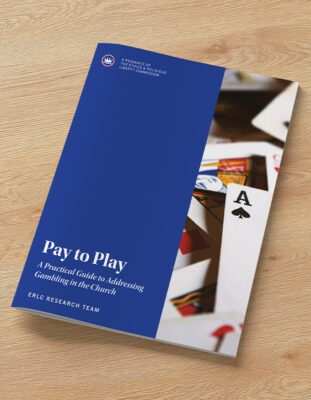Sports gambling imposes multiple implications on every level of human life—personal, institutional, and societal—and Christians must consider how to respond biblically. The gambling industry is rooted in predation, greed, covetousness, and idolatry. Additionally, the addictive nature of gambling leads to physical, emotional, and relational harm, particularly within families and communities. A Christian framework for understanding sports gambling looks to biblical principles such as stewardship, contentment, and the promotion of virtue. It also explores the role of government in protecting citizens from predatory practices that harm both individuals and their communities, looking to past successful policies that curbed the tobacco industry in similar ways. Ultimately, we advocate for strict curtailment of sports betting, opposing legalization in states that have yet to do so and advocating for effective regulation in states that have already legalized the practice. Our aim should be twofold: protecting individuals and society while fostering a culture of personal responsibility, virtuous living, and societal flourishing.
INTRODUCTION
Gambling is typically defined as the risking of money or other objects of value in order to gain further reward based on uncertain outcomes of games or bets.1We maintain that all forms of gambling present moral issues and thus merit serious ethical consideration. This paper will focus on participation in sports betting and the specific problems that spawn from this especially pernicious arm of the gambling industry. The gambling industry is characterized by predatory practices that disproportionately profit off of gamblers with severe addiction and compulsive habits. In the realm of online sports betting, for instance, less than 5% of gamblers make more than they deposit, while nearly 50% of profits come from the 3% of gamblers that lose the most money.2Taylor, Wayne and McCarthy, Daniel and Wilbur, Kenneth C., Online Gambling Policy Effects on Tax Revenue and Irresponsible Gambling (June 06, 2024). SMU Cox School of Business Research Paper No. 24-7, Available at SSRN: https://ssrn.com/abstract=4856684 or http://dx.doi.org/10.2139/ssrn.4856684 Sports betting has become one of the most prevalent realms of the gambling industry in recent years. Yet, its advertising and operating strategies are predicated upon taking advantage of the economically disadvantaged and those who are most at risk for addiction. While all facets of the gambling industry are morally sanctionable, this paper will primarily focus on the rapidly developing realm of sports betting.
In 2018, the U.S. Supreme Court struck down the Professional and Amateur Sports Protection Act (PASPA), the federal law that banned most sports betting in the United States. From 1992 until the overturning of PASPA, sports betting was largely prohibited in the United States as neither the state nor businesses could profit from gambling on sporting events.3Charles Fain Lehman, “Legalizing Sports Gambling Was a Huge Mistake,” The Atlantic, September 23, 2024, https://www.theatlantic.com/ideas/archive/2024/09/legal-sports-gambling-was-mistake/679925/. In 2012, New Jersey legalized sports gambling in response to fears of losing revenue, prompting a lawsuit from the National Collegiate Athletics Association (NCAA), which alleged that the state was violating PASPA. New Jersey filed a counter-lawsuit against the NCAA, claiming that PASPA infringed on state autonomy and gave excessive power to the federal government which was to be reserved for the states. The case went to the Supreme Court, which ruled in 2018 that PASPA violated the “anticommandeering” principle of the Tenth Amendment. Essentially, the court found that the federal government does not have the authority to prevent states from making or modifying laws on sports gambling. It was up to the individual states to decide the legality of sports betting. As of 2024, 38 states and the District of Columbia have legalized sports betting.
The impact of sports gambling on American life and culture since the overturning of PASPA is overwhelming. According to a Seton Hall University poll, more than one in three Americans are betting on sports.4Michael Ricciardelli and Marty Appel, “Sports Poll Finds Slowed Growth for Sports Betting,” Seton Hall University School of Business, February 23, 2024, https://www.shu.edu/business/news/sports-poll-finds-slowed-growth-for-sports-betting.html. In 2023, the American Gaming Association found that sports betting had increased more than 44% at $10.9 billion, a significant share of the $66.5 billion total national gambling revenue.5John Scott Lewinski, “Who Wins in the Ubiquitous New World of Mainstream Sports Betting?,” Common Good, Spring 2024, Issue 15, p. 35. Needless to say, sports betting is a very lucrative business and a cultural phenomenon that impacts various aspects of life and society. Because of this influence, Christians need to understand how to approach these practices.
For Christians, sports gambling raises several questions that we need to address: Am I not free to use my own money in whatever way I decide? What is wrong with making a quick dollar if it is legal? Does gambling really hurt others? Within these baseline questions is a multi-faceted set of moral and theological implications that convey the importance of understanding how a Christian worldview engages with the issue of gambling. Sports betting and gambling impact various aspects of human life, and we must be prepared to address these issues from a biblical framework that communicates God’s design for humanity in how it relates to creation and, ultimately, himself. Based on our biblical convictions and Baptist tradition, we affirm that God’s intended design is for humanity to steward God’s resources, including money, in a manner that reflects the goodness of his provision, our joy in contentment, and his desire to see the dignity of every person as God’s image bearers affirmed—individually, through interpersonal relationships, and within society.
Southern Baptists have consistently spoken on the perils of the gambling industry and the responsibility of Christians to steward our resources—time, talents, and material possessions—as an act of worship to God and for the good of others.6Baptist Faith & Message 2000, “Article XIII: Stewardship,” https://bfm.sbc.net/bfm2000/#xiii. This paper provides a biblical and theological framework for how Christians should think about sports gambling. We must recognize that sports betting has both personal and social implications contrary to God’s ordering for human relationships, stewardship of his resources, and cultivation of Christian virtues. Based on this framework, this white paper offers principles for policy approaches relating to sports betting.
BIBLICAL AND THEOLOGICAL EXEGESIS
Central to a biblical argument against sports gambling is that it thrives on exploitation and preys on the vulnerable, namely the economically disadvantaged and those who are at risk of severe gambling addiction. On the personal level, sports gambling is often motivated by covetousness, denying God as the provider and failing to be content with his provision. Thus, the impact of sports betting, legal or not, has implications that negatively affect the individual, one’s interpersonal relationships, the community, and society at large beyond its economic impact. The following sections give the foundations upon which Christians should think about sports gambling and its implications. First, we provide a general overview of our overall framework for understanding the impact of sports betting at the personal, relational, and societal levels. Second, we offer a biblical exegesis, outlining what Scripture says about God’s call for stewardship, relationships, human dignity, and cultivating virtue. Third, we provide a theological construction for engaging the issue of sports gambling based on the propositions drawn from the biblical exegesis.
I. The Framework
As Christians, we should engage society to pursue a redemptive good that leads toward human flourishing. The Baptist Faith & Message 2000 states, “All Christians are under obligation to seek to make the will of Christ supreme in our own lives and in human society.… Every Christian should seek to bring industry, government, and society as a whole under the sway of the principles of righteousness, truth, and brotherly love.”7Baptist Faith & Message 2000, “Article XV: The Christian and the Social Order,” https://bfm.sbc.net/bfm2000/#xv.
Sports gambling is a holistic issue that negatively impacts the physical, emotional, and spiritual well-being of every level of human life and relationships.8Emma Seal et al., “The Gambling Behaviour and Attitudes to Sports Betting of Sports Fans,” Journal of Gambling Studies 38, no. 4 (December 2022): 1372, https://doi.org/10.1007/s10899-021-10101-7. Research on sports betting has revealed that its adverse effects are not just found within the individual but the larger society as a whole.9Seal et al., “The Gambling Behaviour and Attitudes to Sports Betting of Sports Fans,” 1372. As Christians, we understand that a robust theology of sin articulates its effects on the entirety of the human experience, thus acknowledging that sports gambling can inevitably impact each area as well. At the personal level, sports gambling both fosters and feeds on the sins of greed and covetousness, as its goal is the attainment of money quickly, relying on chance rather than work. Research has also found that sports gambling leads to an elevated use of alcohol or illicit drugs, contributing to physical and emotional health problems.10Ken C Walters and Jeffrey L. Derevensky, “Comprehensive Review of Sports Wagering and Gambling Addiction,” (February 2019): Washington, DC: National Center on Problem Gambling. Subsequently, such abuse can lead to the rise of other significant mental health issues. On an interpersonal level, sports gambling negatively impacts relationships as it contributes to inter-partner and family violence.11Kyutaro Matsuzawa and Emily Arnesen, “Sports Betting Legalization Amplifies Emotional Cues & Intimate Partner Violence,” (August 27, 2024) Rochester, NY: Social Science Research Network, 18.https://doi.org/10.2139/ssrn.4938642 On a more extensive social level, sports betting companies have perpetuated injustice and kept impoverished people disenfranchised. Those who are disadvantaged—economically and socially—tend to be the most susceptible groups to fall prey to the adverse economic effects of gambling.12Brett Hollenbeck and Poet Larson and Davide Proserpio, “The Financial Consequences of Legalized Sports Gambling” (July 23, 2024), 23–27. Https://ssrn.com/abstract=4903302.
Therefore, a prudent, Christian approach to sports gambling should address the issue from a perspective that sees the interconnectedness of its inherent problems from an individual, interpersonal, and societal perspective.
II. Biblical Foundations
Scripture holistically bears out the normative and formative aspects of the Christian life. In other words, there are standards and norms by which God demands his people to live, and there are virtues that God wishes to cultivate within his people. In this section, we point to how Scripture articulates an expansive view of the human experience and how God connects both doing and being in a manner that points to his good intentions for creation. This section will examine how Scripture’s articulation of creation, command, virtue, and worship establishes the parameters by which a Christian ethic of sports gambling can be developed.
Creation
Creation provides a timeless ethical foundation by which God has established a moral framework humans are to follow.13Dennis P. Hollinger, Creation and Christian Ethics: Understanding God’s Designs for Humanity and the World (Grand Rapids, MI: Baker Academic, 2023), 2. Scripture begins with the phrase “In the beginning God,” setting God as the author of creation and the basis of moral norms, ethical standards, and virtues that are binding on humanity. Because of this foundation, any ethical triage of sports gambling must begin with God as the originator of moral decision-making. This is important to the overall conversation because if we do not fully comprehend the centrality of God as creator and subsequently as the standard for all moral activity, we will wrongly conclude that our reasoning is based on our existence and not on God as the ground of all existence.14Mark Liederbach and Evan Lenow, Ethics as Worship: The Pursuit of Moral Discipleship (Phillipsburg, NJ: P&R Publishing, 2021), 33.
The creation account in Genesis 1 and 2 articulates God’s activity in forming the world. It indicates humankind’s responsibility within it through the cultural mandate in Genesis 1:28, which indicates God’s will for humanity to act as caretakers and stewards of his good creation. Psalm 8:6 says, “You have given him [mankind] dominion over the works of your hands; you have put all things under his feet…” These passages speak to God’s authority over all creation and his commissioning of humanity to make something of the world. This includes making culture, an act of doing or building the artifacts of a shared society and shaping that society’s morality and values. As such, concepts like sport and play are cultural artifacts, just as money, business, and commerce are. Because all of creation belongs to God (Ps. 24:1), we are given the responsibility, through the cultural mandate, to steward his creation. An aspect of that faithful stewardship is to ensure that individuals are not unjustly deprived of agency or resources and thus the ability to contribute to the cultural mandate.
Command
Christian living, by God’s transcendent moral standard, is exemplified in the Great Commandment (Deut. 6:5; Lev. 19:18; Matt. 22:37–40; Mark 12:29–31; Luke 10:27–28) and is the foundational metric by which we assess the moral standards and virtues that we are to abide by. The Great Commandment is “‘Hear, O Israel: The Lord our God, the Lord is one. And you shall love the Lord your God with all your heart and with all your soul and with all your mind and with all your strength.’ The second is this: ‘You shall love your neighbor as yourself.’ There is no other commandment greater than these” (Mark 12:29–31). God’s law is intended to establish the relational parameters by which humanity interacts with him and one another. Central to the Great Commandment is love: seeking the good of the other. Love, when its trajectory is God as the author of love and the Ultimate Good, is demonstrated in properly ordered worship where he has supreme allegiance and devotion from our hearts. The command to love others as we love ourselves is to seek their good in a way that promotes flourishing and inhibits injustice.
The Ten Commandments (Exod. 20:2–17) are the categories by which the Great Commandment is lived out. The Tenth Commandment, “You shall not covet” (Exod. 20:17), expressly condemns coveting the possessions of others. Covetousness is the vice on which the gambling industry thrives. The prohibition against covetousness calls for the people of God to be characterized by faithful dependence on God’s provision. Additionally, covetousness violates the First Commandment, “You shall have no other gods before me,” because it places one’s ultimate desires and loves in possessions and wealth rather than the Lord. A disordering of ultimate priorities shows itself in disordered social relationships, often by denying or degrading others who are made in the image of God. Practically, research has shown that this occurs as a result of sports betting through an increase in intimate partner violence, aggression, and other social problems.15 Emma Seal et al., “The Gambling Behaviour and Attitudes to Sports Betting of Sports Fans,” 1372. In other words, covetousness causes us not to love our neighbors as we love ourselves.
Additionally, covetousness embodies what happens when legitimate human desires and appetites are out of control, revealing the tension between obtaining wealth and the failure of riches to satisfy our legitimate needs and desires. Nothing is wrong with wanting to earn a good living and be paid a wage that sustains an individual’s life and family. However, it becomes idolatrous when it leads to an unhealthy desire for money and wealth. When trying to discover the meaning of life, the Preacher in Ecclesiastes 5:10 says, “He who loves money will not be satisfied with money, nor he who loves wealth with his income; this also is vanity.” While humans often assume that gaining riches will satisfy one’s need to achieve a happy and good life, this passage reminds us that the inordinate desire for money and the pursuit thereof is vanity and ultimately meaningless. The essence of God’s commands is to have one’s loves rightly ordered. The Great Commandment reminds us that God requires us to love him with all our being and love our neighbors as ourselves. Covetousness violates both because it places the love of creation above that of the Creator (Rom. 1:22–25; 28–21), inevitably causing us to perpetrate relational and societal injustices against our neighbors.
Virtue
Scripture communicates the contrast between living wisely and foolishly. The virtuous way of life is based upon cultivating wisdom by meditating on and living according to God’s law (Ps. 1). The book of Proverbs provides practical insight and instruction on living wisely according to God’s standards. The essence of Proverbs is to provide advice for practical living, cultivating virtues, and avoiding vice. This, along with God’s commands, reveals that God is concerned with how we live and the people we become. Proverbs 13:11 reminds us that the pursuit of wealth through dishonest or quick means is fleetingly attained and lost. Proverbs 14:31 and 22:22–23 address God’s concern for justice in how we treat the poor and how that treatment speaks to our relationship with him. Proverbs teaches that wise stewardship and compassion for others reflect the character of God, and he wants that character to be embodied within his people. The problem with sports gambling is that it thrives on oppression, exploitation, greed, and discontent.
The New Testament also speaks to God’s desire for a virtuous people. The Sermon on the Mount (Matt 5–7) communicates integrity, contentment, generosity, and peacemaking as kingdom virtues. Additionally, Jesus communicates the blessedness or happiness (Matt. 5:2–12) in pursuing and exemplifying virtues that represent the kingdom of God and his will for living as his ambassadors (2 Cor. 5:20). Within the Sermon on the Mount is a consistent theme of dependence upon God for meeting one’s needs. The instructions Jesus gave his disciples for prayer include trusting God to meet their daily needs (Matt. 6:11). Furthermore, Jesus spent a great deal of time reminding his disciples that not only does the Lord know about their needs, but that as their heavenly Father, he will meet them (Matt. 6:25–32). Jesus reminds them that their priority should be to pursue the kingdom of God, and because God will meet their needs, they need to trust in his daily provision (Matt. 6:33–34).
Paul also speaks of the Christian life as a pursuit of godly virtue. Throughout his epistles to the various churches he planted and partnered with, he provides moral application to the essential doctrines of the faith. Paul uses the language of works of the Spirit to contrast the works of the flesh (Gal 5:16–26). The works of the Spirit embody the virtues of Christ-centered living, whereas the works of the flesh embody the vices antithetical to the life of the Christian. Galatians 5:22–23 communicate that the fruit of the Spirit, or the virtues of Christ-like character, are love, joy, peace, patience, kindness, goodness, faithfulness, gentleness, and self-control. Gambling is not only antithetical to many of the virtues outlined in the fruit of the Spirit, but it also thrives when the works of the flesh like jealousy and envy (Gal 5:19–21) are evident in the gambler’s life. In other words, sports gambling is an activity that both fosters and is nourished by vice, while discouraged when godly virtue is thriving in the life of the individual.
Worship
The idea of worship is intricately connected to the preceding themes of creation, command, and virtue. God created us to reflect his image (Gen 1:26–28) throughout creation for his glory. Otherwise stated, the purpose of humankind is to glorify God in all endeavors. We were created to glorify God and to do good works on his behalf within his creation and in our interactions with others (Is. 43:6–7; Eph. 2:10). Our affections and desires must be subject to God, who is owed the seat of preeminence in our hearts. This is the essence of the Great Commandment and the first two commandments of the Decalogue (Exod. 20:3–6). Our deepest affections and loyalties must go to God.16Evan Lenow and Mark Liederbach, Ethics as Worship: The Pursuit of Moral Discipleship (P&R Publishing, 2021).
The problem with sports betting is that it appeals to the covetous and idolatrous desires within our hearts. In Matthew 6:24, Jesus says, “No one can serve two masters, for either he will hate the one and love the other, or he will be devoted to one and despise the other. You cannot serve God and money.” Jesus clearly states the nature of worship and the inevitable result of where and in whom we place our allegiance. We will either devote ourselves to God or money. Paul warned his ministry protégé Timothy that the love of money is the root of all kinds of evil (1 Tim. 6:9–10). The idolatrous love of money that permeates the gambling industry leads to a variety of personal, relational, and societal problems that devalue legitimate human needs and perpetuate evils. Thus, the author of Hebrews gives a solution to dealing with the temptation to make money into an idol by living a life of contentment in God’s provision and faithfulness (Heb. 13:5).
God has given humankind the responsibility to steward his creation. As an act of worship, humans are to place creation in its proper perspective in light of who God is and what he has entrusted us with. How humanity lives in relationship with God and one another should be based on God’s norms and the virtues he desires within his people. The Scriptures encourage people to model a life of contentment in God’s provision as Lord over all creation and to live a life that avoids covetousness, which leads to idolatry.
III. Theological Construction
Southern Baptists have been consistent in voicing opposition to gambling by issuing 12 resolutions condemning the industry over the last 134 years. The first resolution, in 1890, condemned gambling as a demoralizing vice to society, calling for the state to ban its practice.17“Resolution On Gambling,” SBC, May 1, 1890, https://www.sbc.net/resource-library/resolutions/resolution-on-gambling/. The most recent resolution, issued at the 2017 Annual Meeting, argued that gambling violates the principles of contentment, stewardship, the golden rule, and freedom from destructive desires. It also called for the government to intervene to curb vice and promote virtue for the common good and societal flourishing.18 “On The Sin Of Gambling,” SBC, June 1, 2017, https://www.sbc.net/resource-library/resolutions/on-the-sin-of-gambling/. Central to Southern Baptists’ convictions against gambling is the idea that gambling is a sin that hurts society, thriving on the oppression of the disadvantaged. Therefore, Southern Baptists affirm the biblical idea that the government is responsible for implementing policies that inhibit vices that harm society and commend virtues that promote its good (1 Pet. 2:13–14).
Based on God’s sovereignty as Creator and Lord over all creation, he has an intended design for humanity that leads to worship and flourishing. The sports gambling industry is antithetical to that design. In cultivating a theological construction on sports betting, we must understand the more significant practical implications of the underlying biblical principles that guide our theology. Starting with the post-Fall reality of Genesis 3, abstaining from sin corresponds with pursuing virtue. The activities we choose to engage in and how we participate are essentially moral by nature in that they either promote virtue or vice. The problem with sports gambling is that it both encourages and thrives in folly and the subsequent sinful practices accompanying it: addiction, laziness, foolishness, selfishness, materialism, violence, drunkenness, and even sexual immorality.
Consider the following destructive trends that have been found, particularly for young men, to accompany gambling.
- An upset loss in a sporting event leads to an 11% increase in male-to-female interpartner violence.19 Matsuzawa and Arnesen, “Sports Betting Legalization Amplifies Emotional Cues & Intimate Partner Violence,” 1.
- Sports are now intertwined with organized crime and illegal betting. Between 1963 and 2018, three players were suspended for violating the National Football League’s gambling policy. There were ten players in 2023 alone.20UN News, “‘Illegal Betting Is the Number One Factor Fueling Corruption in Sports’, UN Conference Hears,” December 16, 2023, https://news.un.org/en/story/2023/12/1144857; Ian Mendes, “Gambling Suspensions for Pro Athletes Are on the Rise. Is This the Tip of the Iceberg?,” The New York Times, accessed October 25, 2024, https://www.nytimes.com/athletic/5201567/2024/01/18/gambling-suspensions-sports-nhl-shane-pinto/. This trend is expected to trickle down to college players as sports betting expands.
- Those who engage in sports betting are disproportionately engaging in binge drinking.21Joshua B. Grubbs, and Shane W. Kraus, “Binge Drinking Among Sports Gamblers,” JAMA Network Open 7, no. 4 (April 1, 2024), 4, accessed December 17, 2024, https://jamanetwork.com/journals/jamanetworkopen/fullarticle/2816784.
Possessing the right heart posture is closely associated with pursuing virtue and abstaining from sin. One cannot do these things while pursuing the desires of the flesh (Gal. 6:16). Covetousness, greed, discontentment, dishonesty, deception, and foolish living are all heart conditions grounded in idolatry. The underlying heart posture that permeates the sports gambling industry fails to lean on God and his goodwill to provide and care for his people. While it can seem innocuous on the surface, sports betting places the trust of our finances and resources in the hands of luck, chance, and the performance of others with whom we typically have no relationship. Furthermore, sports gambling feeds the desire to get rich off of the misfortune of others at the risk of one’s family and their well-being.
Additionally, Christians are called to a lifestyle of stewardship–leveraging our resources wisely. God instituted work before the Fall (Gen 2:15), indicating that it is a good and admirable activity. It is a noble endeavor in which men and women can participate and profit from their labor. Money is a tool and a gift from God and should be treated as such. Sports gambling violates God’s good design for vocation by amplifying a ‘get rich quick’ mindset that seeks to bypass labor for easy, unearned money. Therefore, sports gambling does not enrich labor because its activity is fleeting. Proverbs 13:11 says, “Wealth gained hastily will dwindle, but whoever gathers little by little will increase it.” In other words, the path toward financial stability is through having a proper view of money and stewardship according to God’s standards. Sports betting has the opposite effect on the economic well-being of the family. Hollenbeck et al., note,
We find a substantial increase in bankruptcy rates, debt collections, debt consolidation loans, and auto loan delinquencies…. These results are stronger for states that allow sports gambling online compared to states that restrict access to in-person betting and larger in young men in low-income communities.22Brett Hollenbeck, Poet Larsen, and Davide Proserpio, “The Financial Consequences of Legalized Sports Gambling,” SSRN Scholarly Paper (Rochester, NY: Social Science Research Network, July 23, 2024), 1, https://papers.ssrn.com/abstract=4903302.
The result of gambling epitomizes the warning in Proverbs 13:4: “The soul of the sluggard craves and gets nothing, while the soul of the diligent is richly supplied.” The call to biblical stewardship is to engage in work and vocation, earn a living, and adequately manage one’s resources for the glory of God and the good of one’s community.
Human dignity is the final principle to examine in formulating a theological construction of an ethic addressing sports gambling. All people are made in the image of God (Gen. 1:27–28) and, as such, possess inherent dignity and respect as persons. Unfortunately, the sports betting industry commodifies and dehumanizes athletes. Sports gambling reduces the athlete to the fan’s money maker, and their value is thus determined by their performance or lack thereof. They become dehumanized to the point that if an athlete has a poor performance, a team loses or does not cover the point spread, and someone loses money, athletes draw the ire of fans to the point of receiving death threats.23Timothy Lamer, “All Bets Are on: The Growth of Sports Gambling Has Led to Obsessed Fans, Threatened Players, and Suspicions of Cheating,” World, 39, no. 10 (May 18, 2024): 26–28. In one instance, an athlete was messaged by fans demanding he reimburse them for money lost betting.24 Madison Williams, “Auburn QB Payton Thorne Says Fans Demanding Venmo Payments After Loss to Cal,” SI, September 10, 2024, https://www.si.com/college-football/auburn-payton-thorne-says-fans-demanding-venmo-payments-after-loss-cal The National Collegiate Athletic Association (NCAA) states that one in three student-athletes have experienced harassment due to sports-betting.25 “Draw the Line on Sports Betting,” NCAA.org, accessed December 20, 2024, https://www.ncaa.org/sports/2024/3/15/draw-the-line-on-sports-betting.aspx. These instances will likely increase because social media gives fans access to athletes in ways never before seen. Sports fans must remember that wins, losses, and performance do not determine the competitors’ value and dignity. Therefore, Christians need to make every effort to speak against the temptation of commodifying athletes, which sports betting inevitably fosters.
POLICY PRINCIPLES
1. Government has the duty to promote good among its citizenry.
The biblical description of government defines its role largely with reference to the promotion of good within society. We see that the institution of government is meant to actively approve what is good (Rom. 13:3–4) and “praise those who do good” (1 Pet. 2:14). These responsibilities are broadly stated, but they have direct application in the context of government regulation of sports gambling on the personal, institutional, and societal level.
Applying these principles to our modern system of government, it is important to recognize that the Founding Fathers repeatedly stated the necessity for virtuous citizens in the context of a representative republic. In his Farewell Address, Washington made clear his conviction that virtue was as essential an element of the American regime as the written Constitution itself, esteemed as “a necessary spring of popular government.”26“Founders Online: Farewell Address, 19 September 1796” (University of Virginia Press), accessed September 24, 2024, http://founders.archives.gov/documents/Washington/05-20-02-0440-0002. This statement reflected the general consensus of all the American Founders. Thomas Jefferson asserted that deterrence from vice was “necessary to render the people a sure basis for the structure of order & good government.”27 “Founders Online: Thomas Jefferson to John Adams, 10 December 1819” (University of Virginia Press), accessed September 24, 2024, http://founders.archives.gov/documents/Jefferson/03-15-02-0240. Benjamin Franklin believed that “Only a virtuous people are capable of freedom.”28 “Only a Virtuous People Are Capable of Freedom,” National Center for Constitutional Studies, accessed September 24, 2024, https://nccs.net/blogs/articles/only-a-virtuous-people-are-capable-of-freedom. While the Founders primarily meant for such character to be inculcated through local and state-level institutions, even the policies of the federal government should be reflective of this end of fostering virtuous citizens.
Government also has a vested interest in ensuring that the mediating institutions upon which society rests are healthy and thriving. While the institution of family is the building block of society, and healthy families lead to healthy communities, gambling addiction accelerates the deterioration of the family unit through poor financial stewardship, abandonment, and interpartner violence. While our system of limited government must ensure individual liberties and refrain from overstepping its constitutional bounds, it can simultaneously facilitate an environment in which families can thrive. Whether on the local, state, or federal level, proper government regulation of a harmful practice such as sports gambling does not equate to an infringement on personal freedoms.
The promulgation of good extends beyond the moral and institutional concerns of personal virtue and healthy families. It also includes the encouragement of healthy practices among society as a whole. Gambling addiction is a growing public health crisis in the United States, implicating concerns beyond issues of personal character and virtue.29 P. Johnstone and M. Regan, “Gambling Harm Is Everybody’s Business: A Public Health Approach and Call to Action,” Public Health 184 (July 2020): 63–66, https://doi.org/10.1016/j.puhe.2020.06.010. From a public health perspective, the government’s duty to promote good includes the physical and psychological well-being of its citizens. Just as the government has the right and duty to oppose harmful and addictive practices like smoking, it has the responsibility to promote healthy lifestyles by regulating various forms of sports gambling.
2. Government has the obligation to protect its citizens from predation.
Romans 13:3-4 proclaims that “rulers are not a terror to good conduct, but to bad.” Therefore, Paul warns the church to abstain from evil deeds, admonishing, “if you do wrong, be afraid, for he [the state] does not bear the sword in vain. For he is the servant of God, an avenger who carries out God’s wrath on the wrongdoer.” This helps to frame the discussion of government action against sports gambling companies because their business models are largely predicated upon the oppression of the poor. Sports gambling corporations take advantage of low-income Americans, who are much more likely to suffer the adverse effects of sports betting and suffer from addiction. These companies implement predatory tactics such as deceptive promotions, nonstop advertising during sporting events and broadcasts, and even AI algorithms that calculate the most effective ways to keep compulsive gamblers hooked.30 Sports Betting Boom Fuels Concerns over Problem Gambling | 60 Minutes, 2024, https://www.youtube.com/watch?v=vDsLu0CWcgk.
On the individual level, the government has an imperative to protect its citizens from the predatory and destructive effects of sports gambling. The addictive properties of problem gambling are immense, and the likelihood of addiction rises dramatically with higher accessibility through the ubiquity of online sports betting and aggressive marketing campaigns. Research has found that “increased availability will likely increase sports wagering and related gambling problems [and]… Sports wagering can be an alluring path for some to the onset, maintenance and/or acceleration of gambling problems.”31 Ken C. Winters and Jeffrey L. Derevensky, “Comprehensive Review of Sports Wagering and Gambling Addiction,” National Center on Problem Gambling (February 20, 2019): 3. Legislation must be pursued, as the companies promoting these dangerously addictive behaviors are largely unchecked in the majority of U.S. states at the moment.
On the interpersonal level, sports gambling addiction is linked to marked increases in intimate partner violence and financial ruin. Research has shown that “gambling motivation has a substantial role in increasing aggression and violence levels of sports fans,” which causes behavior disorders and subsequent “psychiatric problems such as aggression and violence in individuals.”32 Ercan Polat & Kadir Yildiz, “The Effect of Gambling Motivation of Sport Spectators on Propensity for Violence in Sport,” Journal of Gambling Studies 37 (2021): 217. Government has a responsibility to protect the life and health of members within all levels of societal relationships. This includes guarding family members of gambling addicts from direct violence, as well as securing society more broadly from sports gambling’s increased propensity towards violence and links to aggression.
Additionally, families and communities are harmed by sports gambling practices through poor stewardship and financial ruin. Studies show that sports betting “leads to higher credit card balances, less available credit, a reduction in net investments, and an increase in lottery play.”33Scott R Baker et al., “Gambling Away Stability: Sports Betting’s Impact on Vulnerable Households,” (June 30, 2024), 31, https://papers.ssrn.com/sol3/papers.cfm?abstract_id=4881086. In Australia, a nation with incredibly lax gambling laws, “gambling losses rose 5% between 2017 and 2018 to $24.89 billion. These statistics demonstrate gambling is an ongoing and increasing threat to individual and public health… for [every] one person with problematic behaviour, an estimated five to ten people are adversely affected.”34 Seal et al., “The Gambling Behaviour and Attitudes to Sports Betting of Sports Fans,” 1372. These community-wide effects of gambling demonstrate that it is more than a question of personal choice, having real implications for society. Thus, legislation should not be seen as an attempt to curb individual freedom, but rather to protect entire communities from the destructive consequences that arise from sports gambling.
3. Opposing the legalization of sports betting practices in states that have yet to do so, while pursuing strict regulation in states that have already legalized the practice.
In the 12 states that have not legalized sports gambling following the Supreme Court’s overturning of PASPA, Christians should staunchly oppose any expansion of the industry. It is clear that sports gambling is incredibly destructive of individual lives, relationships, and institutions. Furthermore, the sports betting industry’s predation against the underprivileged in and of itself is reason enough to stand against it. In this minority of states, such a strategy is quite straightforward. However, in the states where sports gambling has gained a sizable foothold, more incremental approaches may be required.
The regulation of the tobacco industry provides helpful indicators of what can be achieved politically and legally to restrict sports gambling in states that have already legalized the practice. While at present, an immediate total ban may be out of reach in states with legalized sports gambling, these approaches provide a measured and effective approach towards regulation and limiting social harm. Some potential options include limits on how, when, in what manner, and to whom gambling corporations can market their products. Additional measures would also highlight–as in tobacco warnings placed on cartons of cigarettes–the harmful effects of gambling for individuals in any advertising.
This is demonstrated in the work of the Public Health Advocacy Institute (PHAI), led by litigator Richard Daynard. Daynard is one of the primary drivers of historic litigation and settlements against the Big Tobacco industry. PHAI’s current efforts have been directed in large part towards regulation of the gambling industry’s predatory practices to curb the public health crisis of gambling addiction. PHAI recently filed suit against DraftKings for deceptive business practices, alleging that DraftKings’ $1,000 sign-up bonus was intentionally designed to prey on those vulnerable to addiction, as there was substantial fine print requiring users to spend an exorbitant amount of money for an incredibly low likelihood of winning the bonus.35 Zak Thomas-Akoo, “‘Big Tobacco’ Litigator Class Action against DraftKings to Proceed,” NEXT.Io (blog), August 22, 2024, https://next.io/news/marketing/draftkings-big-tobacco-litigator-class-action/.
The trajectory of this case is encouraging: when DraftKings asked for the suit to be dismissed, Massachusetts Superior Court judge Debra Squires-Lee “concluded the allegations ‘plausibly suggest’ they [plaintiffs] were harmed because they bought into a service worth less than what they believed based on the promotion.”36 Ibid. This development should encourage further attempts to regulate the gambling industry in important ways, much like the historic Tobacco Master Settlement Agreement in 1998. This settlement resulted in higher cigarette prices, highly restricted tobacco advertising, the elimination of practices that obscured the health risks of smoking, and large payments that were directed toward anti-tobacco programs.
With this precedent in mind, proponents of sports gambling regulations can pursue specific and effective policies. Basing our efforts on existing advocacy and successes, we can center around the fact that “Targeted interventions, stricter regulation of gambling advertisements, and support for safer investment opportunities are crucial to mitigating the adverse effects on financially vulnerable populations.”37 Baker et al., “Gambling Away Stability,” 32. We can push forward policies that require sports gambling companies to be clear about the significant dangers associated with its industry, much like how cigarette packaging is required to display warnings about the health risks involved in smoking. Other lanes of regulation are strict curtailments on sports betting advertisements and potential restrictions on the practice through the internet and mobile apps. We can also support litigation to hold sports gambling companies financially responsible for the public health devastation they have caused.
This is hardly an exhaustive list, but it certainly demonstrates the various avenues Christians can take moving forward. Such regulations and restrictions should be understood to effectively curb the spread of sports gambling and alert consumers to the inherent dangers associated with the industry. While the ideal outcome is banning sports betting in all states, the current market and political climate suggests a more incremental approach in certain states, one that can more feasibly curtail the predation of sports gambling companies.









